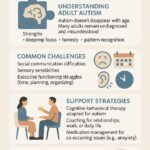Opening Up: Why This Conversation Matters
 If you’ve been feeling off—anxious, drained, emotionally distant, or just overwhelmed—it can be hard to know where to start or who to talk to. A lot of people keep those feelings to themselves at first. And when they finally do open up, it’s not always to a therapist—it’s often to their regular doctor. It might feel a little uncomfortable to bring up mental health at a checkup, but that first conversation really matters. Your primary care doctor isn’t just there for physical stuff like colds or blood pressure—they can also be a key support when you’re struggling emotionally.
If you’ve been feeling off—anxious, drained, emotionally distant, or just overwhelmed—it can be hard to know where to start or who to talk to. A lot of people keep those feelings to themselves at first. And when they finally do open up, it’s not always to a therapist—it’s often to their regular doctor. It might feel a little uncomfortable to bring up mental health at a checkup, but that first conversation really matters. Your primary care doctor isn’t just there for physical stuff like colds or blood pressure—they can also be a key support when you’re struggling emotionally.
Why Do So Many People Hesitate?
There’s a quiet stigma that keeps people from bringing up emotional distress in medical settings. Some worry their doctor will dismiss their feelings. Others fear being labeled or misunderstood. In some cases, people simply don’t know how to describe what they’re experiencing.
These fears are common—and understandable—but they can also delay the help that’s available. Mental health conditions like depression and anxiety are among the most treatable medical issues, especially when caught early. That help often starts by saying, “I’ve been having a hard time emotionally.”
Preparing for the Appointment: Put Words to What You’re Feeling
You don’t need to have a diagnosis or polished explanation ready. But if you tend to go blank under pressure—or minimize your symptoms when someone asks how you’re doing—it helps to reflect in advance.
Think about:
- When the emotional changes began
- How your daily life has been affected (sleep, focus, energy, motivation)
- If anything specific seems to trigger your symptoms
- How long it’s been going on
This doesn’t have to be a checklist. It can be a short note on your phone or a few sentences you rehearse to ease your nerves. You’re not expected to be precise—just honest.
How to Bring It Up Without Feeling Embarrassed
If you’re anxious about how to start the conversation, you’re not alone. Many people freeze up or second-guess themselves. That’s okay. You can keep it simple.
You might say:
- “I’ve been feeling really off emotionally and I’d like to talk about it.”
- “My anxiety’s been getting worse, and I’m not sure what to do.”
- “I think I might be depressed, but I don’t know for sure.”
You won’t be the first—or the last—patient to walk into that room with invisible struggles. Doctors hear these things every day. Their job is to listen, assess, and guide you to the right support.
What Your Doctor Might Do (and What You Can Ask)
Every provider has their own approach, but generally, your doctor will ask questions to better understand your emotional state. They may bring up screening questionnaires or ask you to describe your symptoms in more depth.
If your symptoms seem moderate or severe, your doctor might:
- Refer you to a licensed therapist or psychiatrist
- Recommend a trial of medication if appropriate
- Suggest lifestyle changes as part of a holistic plan
- Encourage you to check in again soon
It’s also okay to ask your own questions, such as:
- “What kind of therapist do you think I should see?”
- “Are there risks to starting medication?”
- “How can I find a mental health provider that takes my insurance?”
You’re allowed to advocate for yourself and seek clarity. Good care is collaborative.
If It Doesn’t Go Well: What to Do Next
Unfortunately, not every doctor responds with empathy or adequate follow-up. If you feel brushed off, rushed, or shamed, that isn’t a reflection of your worth—it’s a signal to try another provider.
Mental health deserves to be taken seriously. You deserve to be taken seriously. If the first conversation doesn’t go as planned, it doesn’t mean the next one won’t.
You can also reach out directly to a therapist if you feel comfortable skipping the physician step.
Your First Mental Health Appointment: What to Expect
If you’re referred to a mental health provider, your first session may feel a bit like detective work. The clinician will ask about your emotional history, current symptoms, stressors, and goals for treatment. You don’t need to have a perfect narrative—just be open to exploring how you’ve been feeling.
Over time, this becomes a space for reflection, emotional processing, and learning new coping tools. You may not feel dramatically better after the first visit, but starting therapy is often the biggest hurdle.
The most important part? Showing up and allowing yourself to be seen.
External Resources for Starting the Conversation
- MentalHealth.gov – Talk About Mental Health
- National Alliance on Mental Illness (NAMI): Getting Started
- National Institute of Mental Health – Help for Mental Illnesses
- Mayo Clinic – When to Seek Help for Mental Health



